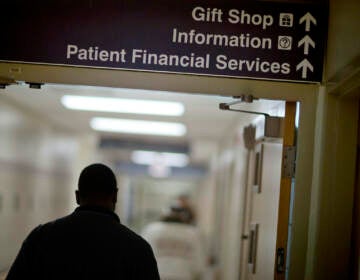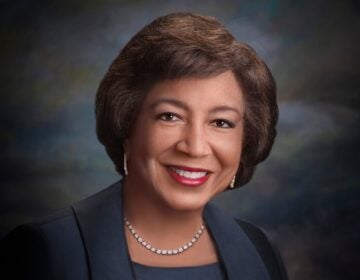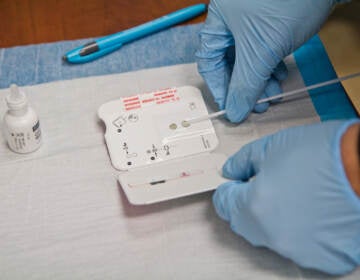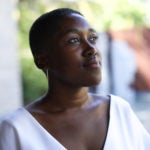This special workforce is alleviating COVID vaccine fears in the most vulnerable communities
Community health workers get to know clients personally by asking them what they need to improve their health, and they raise vaccine trust in hardest-hit groups.
Listen 6:11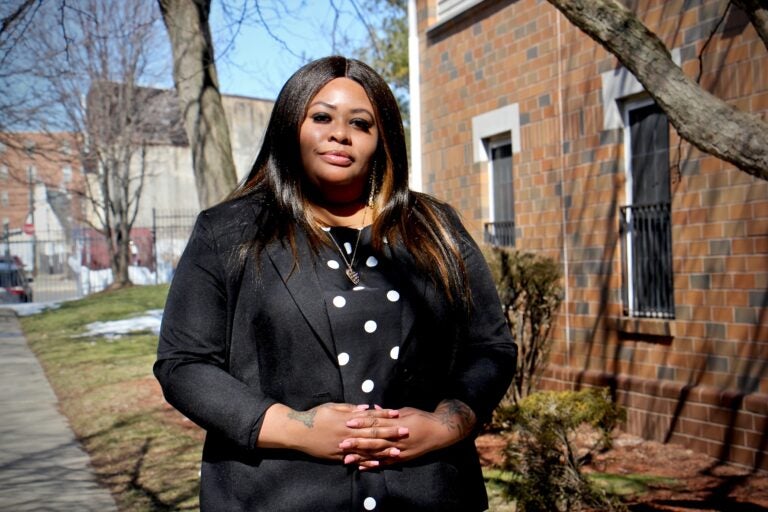
Tawandaa Austin is a community health worker at Penn Medicine. (Emma Lee/WHYY)
This story is from The Pulse, a weekly health and science podcast.
Subscribe on Apple Podcasts, Spotify or wherever you get your podcasts.
When she was in elementary school, Tawandaa Austin noticed that some of her friends were always without lunch money.
“My mom always wondered why I was always packing extra lunches and always finding myself in the middle of others’ problems,” she said.
Austin followed her impulse to help others, first as a recovery specialist with homeless men struggling with addiction. Then she found a job as a community health worker in Philadelphia.
“Everything about my job is rewarding,” Austin said. “I appreciate what people have been through. It teaches me how to be more effective.”
Shreya Kangovi, an internist and founding executive director of the Penn Center for Community Health Workers, said this special workforce has a specific set of qualities and skills that predispose them to address health disparities effectively.
“Community health workers are characterized by almost compulsive levels of altruism,” Kangovi said. “They just can’t help but help people. They are caregivers just naturally in their families and in their communities.”
They are typically employed by hospitals, clinics or grassroots organizations to connect with patients who have chronic diseases or illnesses and may need help navigating care. They are trusted individuals who come from the communities they serve, and who usually share the same socioeconomic and cultural backgrounds as their patients. And unlike social workers and nurses, they are not defined by licensure, but rather by who they are and what they do.
“You might have one patient who needs you for a broken heater in the dead of winter, and you might have to go and attend to that person’s needs so they are not cold at night,” Austin said.
Austin believes she can really connect with her patients because of her own life experiences. At 19, she had her first daughter and recalls the challenges of being unemployed and navigating city resources for child care.
“I remember having my daughter or having times where I felt like I just wanted someone just to talk to or just understand what it’s like to be in that situation,” Austin said.
‘You can’t establish health goals for other people’
Typically, community health workers are paired with patients who live in high-poverty neighborhoods and are battling a confluence of health and social inequities, from housing insecurity to high blood pressure. They have been pivotal to COVID-19 vaccine education in some of the communities hardest hit by the pandemic.
In February, Austin met a new patient, Geraldine Kennedy, a 78-year-old Black Philadelphian. She felt an instant connection to the older woman during their first call.
“She shared a few stories with me about being in school, what it was like to be in school around that time, and her having a dream and her dream being shattered by a teacher,” Austin said.
Kennedy was in elementary school in the 1960s, when she had to write an essay about what she wanted to be when she grew up. She remembers returning to the class the next day with her essay and telling her teacher she could see herself becoming a bookkeeper, working with financial records.
“And the teacher said that they didn’t think that I would be able to do something like that,” Kennedy said. “ [I was] just thinking, why does she think that I’m not capable of being what I say I want to be?”
Kennedy has never forgotten that moment of being dismissed and underestimated. Austin said that, as Black women, they have a shared experience of discrimination that allows her to build a strong rapport with Kennedy.
Subscribe to The Pulse
When Kennedy was referred to the community health worker program at Penn Medicine, she had been struggling with heart issues and had concerns about the efficacy of the coronavirus vaccines that were available to her.
But according to Austin, community health workers are taught to look at patients as comorbid, meaning they may be dealing with many diseases or barriers at once. Austin takes into account the whole person and asks that person to articulate what is making it hard to stay well or access health care systems. Before Austin could address Kennedy’s fears about COVID-19 and getting vaccinated, she had to make sure Kennedy had her other needs met as well.
“You can’t establish goals for other people,” Austin said. “You have to allow them to do it, or you’ll have these expectations that aren’t real and that could possibly turn the patient completely off. So [community health workers] roll with the patient and learn how to be supportive.”
During their first conversation, Austin said, Kennedy mentioned she wanted to work on her heart health.
“[Tawandaa] got in touch with my primary doctor because I was concerned I might have a heart problem, because at times I’ve been out of breath … just doing the slightest things,” Kennedy said.
But Kennedy also had issues getting to her pharmacy because she’s not as mobile now and it’s some distance away. Austin helped Kennedy get her medications delivered to her home and get certain medical expenses covered by her insurance. As a result, a powerful trust emerged between the two women.
‘I will try and see what her biggest fears are’
Kennedy said that Austin is like a daughter to her now, and that it’s common for her to call Austin out of the blue just to talk and laugh with her. When her husband and immediate family began pressing her to get the COVID-19 vaccine, Kennedy turned to Austin.
“We were talking about the pandemic because my husband received his [vaccine] and at first I was kind of skeptical,” Kennedy said. “Because of what has happened previously in our culture, you know, using us as guinea pigs for some of this stuff.”
Kennedy was referring to historical atrocities such as the Tuskegee experiments, in which doctors used a Black population to observe the effect of untreated syphilis. The Black subjects were told they were receiving treatment for bad blood, when, in fact, they received no treatment at all.
Last November, the NAACP published a survey in which only 14% of Black respondents said they trusted the COVID-19 vaccines’ safety, and only 18% said they would definitely get vaccinated.
In February, Fatima Cody Stanford, a physician at Harvard Medical School, co-wrote an article in the New England Journal of Medicine entitled “Beyond Tuskegee — Vaccine Distrust and Everyday Racism.” She said looking to events like Tuskegee is not enough to unpack the kind of sustained, everyday harm and trauma Black Americans continue to experience in medical spaces.
“Attributing distrust primarily to these instances ignores the everyday racism that Black communities face,” Stanford wrote. “Every day, Black Americans have their pain denied, their conditions misdiagnosed, and necessary treatment withheld by physicians. In these moments, those patients are probably not historicizing their frustration by recalling Tuskegee, but rather contemplating how an institution sworn to do no harm has failed them.”
Community health workers like Austin have the lived experience of these harms in health care. She said she can relate to being dismissed or patronized during her own routine health screenings. And it’s those moments she harnesses to reach patients such as Kennedy.
People are worried whether the vaccines are safe, whether they were tested thoroughly, and Austin meets them where they are.
“I will try to see what are her biggest fears around [the vaccines] and try to figure out if we can try to address what those fears are, because they might be something that was like a myth,” Austin said.
Austin answered Kennedy’s questions about vaccine efficacy, and even helped her call her doctor so he could answer questions she couldn’t. As Kennedy continued to learn more about the vaccine, Austin made her aware of a vaccine sign-up list through Penn Medicine as she weighed her options.
“It’s almost like … holding hands and walking together,” Austin said. “I know what it’s like to not have that person. And that’s what makes me go harder for the community.”
WHYY is your source for fact-based, in-depth journalism and information. As a nonprofit organization, we rely on financial support from readers like you. Please give today.




![CoronavirusPandemic_1024x512[1]](https://whyy.org/wp-content/uploads/2020/03/CoronavirusPandemic_1024x5121-300x150.jpg)
